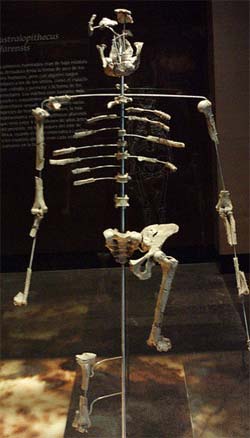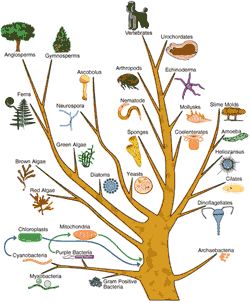All of this data cries out for a theory to explain it. And evolution does a terrific job.
In fact, it explains the data so well that almost no scientist disputes it. Nearly all life scientists use the backdrop of evolution to help plan and interpret their experiments.
And yet in a study from a couple of years ago, over half of Americans reject evolution. This is mind boggling.
It is like thinking the evidence is inconclusive that the Earth is round. Or that other stars have planets around them. So why do so few Americans accept that the evidence is that compelling?
 Largely because it conflicts with their religious beliefs. But that explanation doesn’t help partly because I asked the wrong question. A better question might be, "Given that the evolution is the only scientifically testable theory that explains all of the data, why do people think they can refute it? Or think that the evidence for evolution is not strong?"
Largely because it conflicts with their religious beliefs. But that explanation doesn’t help partly because I asked the wrong question. A better question might be, "Given that the evolution is the only scientifically testable theory that explains all of the data, why do people think they can refute it? Or think that the evidence for evolution is not strong?"
A big reason is a lack of understanding about what science is. Science is not a belief. Scientists don't believe in evolution like most people believe in God.
If a better model came around that could explain the data, scientists would drop evolution and use the new model. And believe me, some young hotshot scientist somewhere would love to become famous by showing that evolution is wrong.
Of course not any model will do. Anyone can propose an idea. To work, the theory would have to make predictions that you can test with experimentation. Evolution does this.
No other model out there does. Creationism certainly does not. Nor does Intelligent Design.
Only evolution makes testable predictions. And these predictions lead to new experiments that can lead to changes in the details about how evolution works.
This is another area where the public often misunderstands science. Scientific theories are not written in stone. They are not like religious beliefs. A theory is modified to fit new data.
This isn't wishy-washyism at its worst. This is just how science works. Scientists do not know everything and so propose theories based on the data they have. New data can change a theory. Or more rarely, a new theory can be proposed to replace the old one.
But with the huge body of data that supports evolution, it is very unlikely there will be a smoking gun that causes us to replace it with a new theory. There would need to be a lot of new data to support some other model. And there isn't any.
Another misconception is that a current theory has to explain everything right now. And if it can't, then the whole theory is bunk.
Again, this isn't how science works. If there is some data that the current theory of evolution can't explain, scientists will modify the theory so that it fits the data. Or do experiments or find evidence that explains the data.
This often happens with the fossil record. Someone will show a gap in the record and say that because of the gap, all of evolution is wrong. Of course this ignores the mountains of other data that do support the theory. And scientists often then find fossils that fill in the gap and so people opposed to evolution look for new gaps.
In other words, you don’t get rid of the whole theory because some data doesn't fit. No more than we got rid of Christianity when Galileo saw moons orbiting Jupiter.
Of course, scientists shoulder some of the blame too. As I wrote last blog, scientists don't tend to be the best communicators. So you get a lawyer or a clergyman whose job it is to talk against a scientist whose job it is to do science. Guess which one sounds the most convincing?
But science isn't American Idol. Or Yahoo Answers. The audience doesn't get to pick who the winner is or what the best answer is based on who has the best sound bite.
The best answer is the one that fits the data and is testable. And that is evolution.
I think a bigger problem has to do with the misuse of science by some scientists. I don't mean the handful who claim that other theories do a better job of explaining the data (although this sows the seeds of distrust as well).
A bigger problem is scientists who use evolution as a weapon against God. Some scientists claim that evolution shows there is no God. This is, of course, rubbish.
But when religious people hear this kind of talk, they naturally turn against evolution. After all, if evolution is proof that there is no God and I believe there is one, then evolution is bunk. It is important to state that evolution has nothing to do with God.
But evolution is real. Which means believers in a Judeo-Christian God will eventually need to incorporate it into their religion. And many, many believers are doing that right now.
More interviews with scientists about evolution
http://www.thetech.org/genetics/pov_atkins/index.html
A great website about evolution
http://evolution.berkeley.edu/
If people evolved from apes, then why are there still apes?
http://www.thetech.org/genetics/ask.php?id=150
 Last blog I talked about some of the reasons scientists are to blame for the public’s distrust of science. This week I want to look at what all of this means in the context of a concrete example--evolution. In the near future, I'll talk about this topic with regard to genetically modified organisms
Last blog I talked about some of the reasons scientists are to blame for the public’s distrust of science. This week I want to look at what all of this means in the context of a concrete example--evolution. In the near future, I'll talk about this topic with regard to genetically modified organisms
